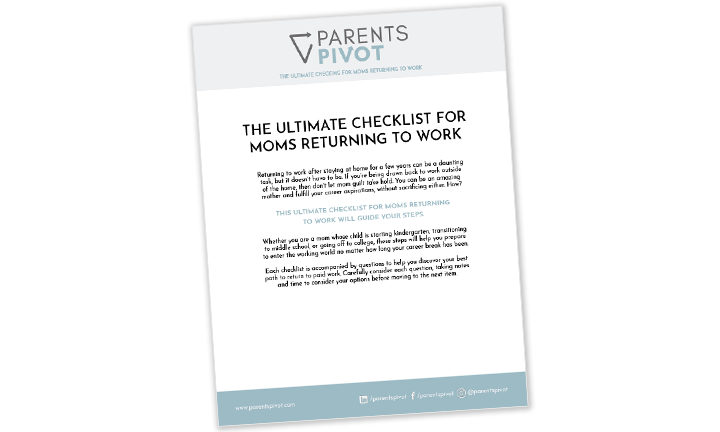When was the last time you completed a day of paid work outside of the home? It doesn’t matter if it’s been 3 months or 3 years, the transition from being at home and focusing on family back to paid work can be daunting.
I was on an expat assignment with my husband, in both the Philippines and China, when we had our two daughters. Each time I took a career pause to welcome one of our daughters into the world, there was a transition that had to be made. Not just for me but for our entire family. I was overseas when I decided to focus my coaching career on my passion to help moms pivot back to paid work.
Expert Tips To Transition Back To Paid Work
Navigating the transition back to paid work, whether you are returning from parental leave or returning from a longer career pause, can be done well and stress-free with a little planning and support from your village. Here are a few tips (from moms who have done it!) on how to set yourself up for success in the first few months after your return.
Practice the logistics ahead of time. When you return to paid work, there will be many moving parts to get everyone where they need to be. To set yourself - and everyone else - up for success, practice before it’s the real deal! Have your nanny come before you have to return to ease the transition for your little one (and you). Practice the carpool routine or drive to work during the normal drive time to determine how long it will take. Practice school pick up routes and times that will happen after you have returned to work. The more everyone is comfortable with the new logistics, the better it will go on Day 1. Less stress, less tears, and more smiles!
Talk with your employer about flexible arrangements as you get settled. You may agree to a 9-5 work schedule, but then realize school drop off takes longer than you expect and can’t make it into the office until 9:15. Ask for flexibility and understanding as you figure out the logistics.
Find a time management system that works for you. You won’t have much time to do your household chores after you transition to paid work, so time management tools will be critical to your success. One of my favorite things to do is batch cook over the weekend so that I just have to reheat during busy weeknights or pull a freezer meal and pop it in the oven. This Meal Solution Handbook from a fellow busy mom is filled with delicious recipes and amazing tips to make cooking easier for you.
Start To shift your household responsibilities. Have discussions with your partner about how you might reorganize responsibilities when you return to paid work. Kid pick up, grocery shopping, laundry, and even walking the dog might need to be done differently. Setting expectations of how much you can handle with your new workload, and how others can help out, will eliminate a lot of stress.
Think about your values. Who do you want to be as a leader? As a parent? Identify values that you want to uphold in both areas and set goals that help you combine work and life. For example, I wanted to increase my social connections coming out of the COVID-19 pandemic’s lock down. I also wanted to deepen my learning for my coaching practice. I combined these two ideas into one goal and set up coffee dates with other coaches who I could learn from - it was a win-win!
Don’t neglect self care. It’s so important to not sacrifice your own health and well being while caring for everyone else, and that includes after you return to paid work as well. Check out this Ultimate Guide To Self Care For The Working Mom for a great list of ways to love on yourself during your transition.
Remember to continually reflect and adjust. You aren’t locked in to any one way of doing things once you return. If something isn’t working, adjust!
For more tips and best practices for pivoting back to paid work after a career pause, check out this blog.
Need More Support To Transition To Paid Work?
Parents Pivot is available to partner with you during your pivot, no matter how long your career pause has been. We offer 1:1 and group coaching, as well as provide many resources such as a job search membership, free events, and more. Learn more about our offerings on our website, or contact us today to set up a consultation.












